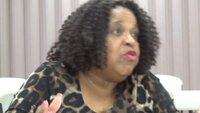| Title |
Burrell, Brenda OH19_041 |
| Creator |
Weber State University, Stewart Library: Oral History Program. |
| Contributors |
Burrell, Brenda, Interviewee; Langsdon, Sarah, Interviewer; Rands, Lorrie, Video Technician |
| Description |
The Beyond Suffrage Project was initiated to examine the impact women have had on northern Utah. Weber State University explored and documented women past and present who have influenced the history of the community, the development of education, and are bringing the area forward for the next generation. The project looked at how the 19th Amendment gave women a voice and representation, and was the catalyst for the way women became involved in the progress of the local area. The project examines the 50 years (1870-1920) before the amendment, the decades to follow and how women are making history today. |
| Abstract |
The following is an oral history interview with Brenda Burrell, conducted on August 26, 2019, at the Second Baptist Church in Ogden, Utah, by Sarah Langsdon. Brenda discusses her life, her memories, and the impact of the 19th Amendment. Lorrie Rands, the video technician, is also present during this interview.; The following is a video clip of an oral history interview with Brenda Burrell, conducted on August 26, 2019, by Sarah Langsdon. In this video clip, Brenda discusses the difference that the 19th Amendment made on women and raising families. |
| Image Captions |
Brenda Burrell 26 August 2019 |
| Subject |
Women in higher education; Voting--United States; Women--suffrage; Women--Rights of women |
| Keywords |
Female voters; 19th Amendment; Suffrage |
| Digital Publisher |
Stewart Library, Weber State University, Ogden, Utah, United States of America |
| Date |
2019 |
| Date Digital |
2019 |
| Temporal Coverage |
1950; 1951; 1952; 1953; 1954; 1955; 1956; 1957; 1958; 1959; 1960; 1961; 1962; 1963; 1964; 1965; 1966; 1967; 1968; 1969; 1970; 1971; 1972; 1973; 1974; 1975; 1976; 1977; 1978; 1979; 1980; 1981; 1982; 1983; 1984; 1985; 1986; 1987; 1988; 1989; 1990; 1991; 1992; 1993; 1994; 1995; 1996; 1997; 1998; 1999; 2000; 2001; 2002; 2003; 2004; 2005; 2006; 2007; 2008; 2009; 2010; 2011; 2012; 2013; 2014; 2015; 2016; 2017; 2018; 2019 |
| Medium |
oral histories (literary genre) |
| Spatial Coverage |
Dayton, City of Dayton, Montgomery, Ohio, United States, http://sws.geonames.org/4509884, 39.75895, -84.19161; Austin, Travis, Texas, United States, http://sws.geonames.org/4671654, 30.26715, -97.74306; St. Louis, St. Louis, Missouri, United States, http://sws.geonames.org/4407066, 38.62727, -90.19789; Ogden, Weber County, Utah, United States, http://sws.geonames.org/11788968, 41.22809, -111.96766 |
| Type |
Text; Image/StillImage; Image/MovingImage |
| Access Extent |
40 page PDF; Video clip is an mp4 file, 177 MB |
| Conversion Specifications |
Filmed using a Sony HDR-CX430V digital video camera. Sound was recorded with a Sony ECM-AW3(T) bluetooth microphone. Transcribed using Express Scribe Transcription Software Pro 6.10 Copyright NCH Software. |
| Language |
eng |
| Rights |
Materials may be used for non-profit and educational purposes, please credit University Archives; Weber State University |
| Source |
Burrell, Brenda OH19_041 Weber State University Archives |
| Format |
application/pdf; video/mp4 |
| ARK |
ark:/87278/s6zve3n9 |
| Setname |
wsu_bs_oh |
| ID |
105451 |
| Reference URL |
https://digital.weber.edu/ark:/87278/s6zve3n9 |
| Title |
Burrell, Brenda OH19_041 |
| Creator |
Weber State University, Stewart Library: Oral History Program. |
| Contributors |
Burrell, Brenda, Interviewee; Langsdon, Sarah, Interviewer; Rands, Lorrie, Video Technician |
| Description |
The Beyond Suffrage Project was initiated to examine the impact women have had on northern Utah. Weber State University explored and documented women past and present who have influenced the history of the community, the development of education, and are bringing the area forward for the next generation. The project looked at how the 19th Amendment gave women a voice and representation, and was the catalyst for the way women became involved in the progress of the local area. The project examines the 50 years (1870-1920) before the amendment, the decades to follow and how women are making history today. |
| Abstract |
The following is an oral history interview with Brenda Burrell, conducted on August 26, 2019, at the Second Baptist Church in Ogden, Utah, by Sarah Langsdon. Brenda discusses her life, her memories, and the impact of the 19th Amendment. Lorrie Rands, the video technician, is also present during this interview. |
| Image Captions |
Brenda Burrell 26 August 2019 |
| Subject |
Women in higher education; Voting--United States; Women--suffrage; Women--Rights of women; Educators; Women educators |
| Keywords |
Female voters; 19th Amendment; Suffrage |
| Digital Publisher |
Stewart Library, Weber State University, Ogden, Utah, United States of America |
| Date Digital |
2019 |
| Temporal Coverage |
1950; 1951; 1952; 1953; 1954; 1955; 1956; 1957; 1958; 1959; 1960; 1961; 1962; 1963; 1964; 1965; 1966; 1967; 1968; 1969; 1970; 1971; 1972; 1973; 1974; 1975; 1976; 1977; 1978; 1979; 1980; 1981; 1982; 1983; 1984; 1985; 1986; 1987; 1988; 1989; 1990; 1991; 1992; 1993; 1994; 1995; 1996; 1997; 1998; 1999; 2000; 2001; 2002; 2003; 2004; 2005; 2006; 2007; 2008; 2009; 2010; 2011; 2012; 2013; 2014; 2015; 2016; 2017; 2018; 2019 |
| Medium |
oral histories (literary genre) |
| Spatial Coverage |
Dayton, City of Dayton, Montgomery, Ohio, United States, http://sws.geonames.org/4509884, 39.75895, -84.19161; Austin, Travis, Texas, United States, http://sws.geonames.org/4671654, 30.26715, -97.74306; St. Louis, St. Louis, Missouri, United States, http://sws.geonames.org/4407066, 38.62727, -90.19789; Ogden, Weber County, Utah, United States, http://sws.geonames.org/11788968, 41.22809, -111.96766 |
| Type |
Text; Image/StillImage |
| Access Extent |
40 page PDF |
| Language |
eng |
| Rights |
Materials may be used for non-profit and educational purposes, please credit University Archives; Weber State University |
| Source |
Burrell, Brenda OH19_041 Weber State University Archives |
| Format |
application/pdf |
| Setname |
wsu_bs_oh |
| ID |
105591 |
| Reference URL |
https://digital.weber.edu/ark:/87278/s6zve3n9/105591 |





